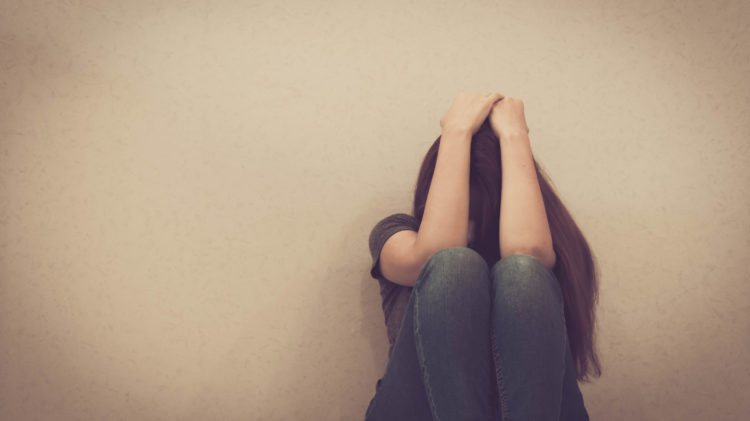Whenever someone you love is hurt it’s hard, but when your girlfriend has been raped it can feel impossible to know what to do. It’s everybody’s worst nightmare for someone they love to be raped. Not only does it traumatise them but it can also be traumatic to those closest to them. It’s entering unknown territory but you aren’t alone.
Unfortunately sexual assault isn’t something that’s never going to affect someone you know. Estimates suggest that 1 in every 4 women experience sexual assault at some stage in their lifetime. Now when you think about how many women experience someone making unwanted advances as well as outright assault and rape, you realise the statistics are much higher.
Speaking as a survivor of rape, it is one of the most harrowing experiences I’ve had. Having to go through the event itself was awful but what came after, in a way was just as bad. I can speak of different experiences. The time a boyfriend forced me to have sex. The occasion where a date forced me to have anal sex without even asking if I liked it, never mind if I wanted it.
I could mention being a 15 year old girl on holiday in Naples, Italy when I got on a tram with my family. The hand that ‘knocked’ against my butt wasn’t accidental. I was groped twice on a public tram by someone I couldn’t even see. You know how tightly packed public transport is – imagine trying to get away from that and having nowhere to go. I didn’t have the courage to tell my mum until we were back in England.
The #MeToo movement is something we’ve all heard about. The media makes it impossible for anyone to ignore the reality of how rife sexual assault is.
How to help your girlfriend
When something like this happens, it can be hard knowing how to help your girlfriend. She may want to talk about it or may want to act like nothing has happened and ignore the subject. Each woman reacts differently to trauma and often won’t want to discuss it with a partner. This might be out of feeling ashamed or just be that she wants to ignore it and move on.
There are some aspects which you probably will need to discuss as a couple. Such as whether she needs to take the morning after pill or get a pregnancy test. As well as the matter of whether she wants to report the rape to the police. Recovering from rape isn’t a quick fix and it will take time for her to feel like herself again. As she comes to terms with what has happened and heals, the best thing you can do is be supportive of her and follow her lead.
You should reassure your girlfriend that you love her, are there if she wants to talk and help her with any concerns she might have. It’s possible that she may want you to attend medical or legal appointments with her. If she asks something of you, do your best to fulfil her request. The fact that she turns to you in a time of distress is a good thing. It reflects trust in you and shows that she wants your support as a partner.
During this time, you might want to speak to someone yourself to help process your own feelings. There are charities which offer support to partners, friends and family of rape survivors as well. If your girlfriend reports the rape, you might be asked to act as a witness in issuing a statement if appropriate about the rape. More so about how your girlfriend’s welfare has been affected and any information you have which may aid the investigation/prosecution of the offence.
Concerns after rape
When your girlfriend has been raped, you’ll want to know how to help her and how to talk to her. Both of you will have concerns and some of those will be practical as well as emotional. Rape nearly always makes you think of unwanted pregnancy, abortion and STI risks. When a traumatic event happens, it can be hard to know where to begin in finding help and dealing with concerns properly.
After a sexual assault or rape, your sexual health will probably be a worry. Abstain from sex until you have had a sexual health screening to confirm you’re safe to resume sex. In the hours immediately after, your girlfriend should think about having a ‘rape kit’ done to secure any DNA left behind from the assault. Naturally you should avoid having sex if you want to have this done because it contaminates the evidence.
It’s generally advisable to go for a sexual health screening 3 weeks, 6 weeks and 12 weeks after a rape. This is true regardless of the extent of the rape, i.e whether a condom was worn and whether or not the rapist ejaculated. Your girlfriend should be tested and you should also. This ensures that you’re both healthy and have nothing to worry about.
If anything does come up on either of your screening tests, you should both be treated. This makes sure that one partner doesn’t re infect the other. It’s also true for simple health issues like thrush. Sex after rape may be more difficult as well due to injuries, anxiety and trauma associated with the rape. You can have other forms of intimacy though without having sex while you abstain. Emotional closeness will likely support and comfort your girlfriend more than sex.
Adjustment
It will take time for both of you to adjust to life after your girlfriend is raped. A lot of couples struggle to reconnect physically or to deal with their own emotions afterwards. Instead of letting things go unsaid, find healthy ways to be open with each other and talk through your feelings. Counselling can help with this as well as writing down your feelings to reflect on them. Try not to argue or say things in anger as this is counterproductive to maintaining a happy relationship.
Although it’s natural to want to talk things through and to discuss the rape. Respect your girlfriend’s wishes if she doesn’t want to talk about it. Equally, if she does want to talk about it and you find that difficult, try to balance your own feelings with her need to communicate. If you feel unable to handle long conversations about it, sensitively reduce the time you spend focusing on the rape. This encourages both of you to move forward beyond it while it still lets her open up to you. Counselling also helps some women explore their own feelings when they need to talk to someone other than their boyfriend.
The rape was not your girlfriend’s fault. While the circumstances rape varies on a case by case basis, regardless of your girlfriend’s actions, she is not to be blamed for being assaulted. A lot of women do feel guilty of having done something wrong however and may internalise their shame into guilt. Encourage your girlfriend to understand that she hasn’t done anything wrong and avoid being angry with her.
Many partners do feel angry or guilty themselves that they couldn’t ‘protect’ them from assault. Find ways to manage any of your own feelings of anger, guilt, resentment without projecting them onto her.
PTSD: Post Traumatic Stress Disorder
Some rape survivors develop post traumatic stress disorder (PTSD) symptoms after rape which is normal. PTSD affects a wide range of people for various reasons. PTSD results from someone experiencing a trauma, whether as an isolated incident or over a prolonged period. Often war veterans will develop PTSD after leaving service due to the stress and trauma they’ve experienced during duty. Some people experience PTSD for a short period and then find the trauma fades away.
In other cases, PTSD becomes a more long term condition which affects someone for some time after the incident (s) occurs. Every individual is different and experiences PTSD differently. It sometimes manifests as anxiety and depression linking to the trauma or having flashbacks and triggers which cause the person to experience panic attacks or ‘melt downs’ which lead to depressive episodes. PTSD prompts some people to self harm or experience suicidal feelings or even make an attempt at suicide.
Although it’s distressing for both your girlfriend and the people around her, PTSD doesn’t have to be a lifelong affliction. Not everybody develops PTSD but for the majority of rape survivors, they will experience some aspects of it after the rape. It’s normal to feel angry, guilty, distress, fearful and ashamed after rape. Some women may not want to be intimate again for a while due to internalised feelings of shame, physical discomfort or emotional distress which makes them scared of sex.
Coping with PTSD
There are coping mechanisms to handle PTSD and support systems in place from your local medical centres as well as online. Your girlfriend may experience certain PTSD triggers (such as passing the location or a similar location to where she was raped, seeing people who resemble her attacker, a certain smell or expression) and find herself going through flashbacks to the assault.
It’s likely that she’ll want to dispose of any clothing or jewellery which she associates with the rape. Try to be supportive even if this means she doesn’t want to wear something you once bought her as a gift. It’s not you, it’s the PTSD link which hurts.
PTSD can go away altogether or you may think it has. Yet then something can prompt a flashback or a PTSD episode to occur. Anniversaries around the rape may prove especially difficult. Engage with support and counselling services available to you. They are there to help and nobody should patronise or dismiss your girlfriends’ feelings or well being.
Moving forward after your girlfriend has been raped
It takes time to recover from rape. Everybody is different and your girlfriend will likely struggle to understand her own feelings afterwards. You may also find yourself struggling to come to terms with it. Be patient with each other and tread carefully when it comes to telling other people about it. It can be better to keep some matters private as not everybody is understanding or confidential about it. While you may want to talk to other people about it due to needing to discuss it yourself, talk to your girlfriend before you tell others. She may feel embarrassed and not want you to tell friends or family.
When it comes to sex, listen to when your girlfriend wants to be intimate again. Some women may crave intimacy with their boyfriend as a form of comfort. Sex connects couples on a physical and emotional level. If she feels vulnerable and wants your love, sharing intimacy provides that. Equally, some women may not want to have sex or want to but struggle to get physical for a while after rape.
It depends on the nature of the rape, but it might be that you need to abstain from sex for a while afterwards while sexual health testing takes place. Be patient with each other and make sure you’re both comfortable emotionally and physically with any intimacy you may have. When your girlfriend has been raped, it’s normal if your sex life changes. Certain activities can trigger PTSD flashbacks or become uncomfortable for her, talk about it and be respectful.
When your girlfriend has been raped, it challenges you to stay strong as a couple. It does get easier though and time does heal, as cliched as that sounds. You should engage with support made available to you and be kind to yourselves. Rather than put yourselves under pressure with the relationship, focus on maintaining a friendship initially. The best recipe for a successful relationship is to be friends as well as lovers and never go to bed on an argument.

